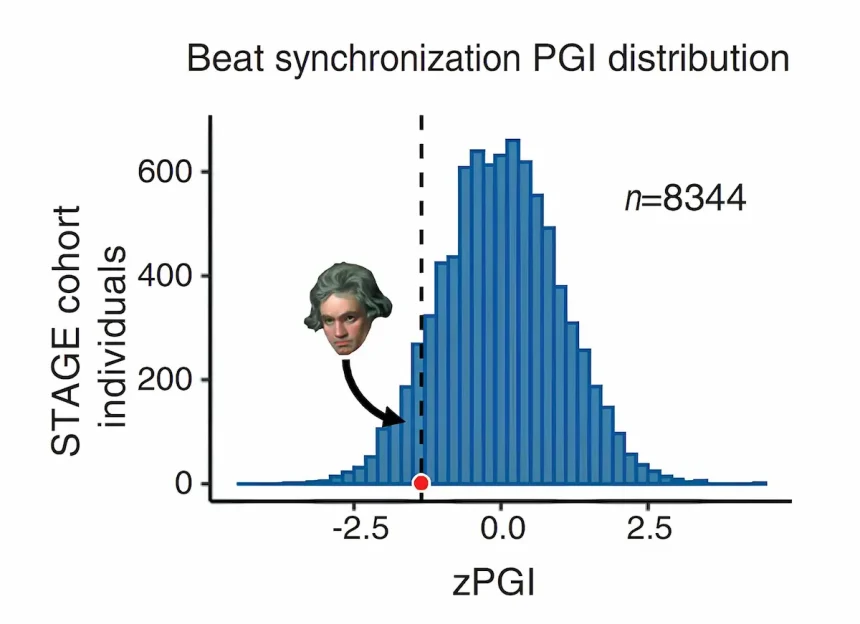The renowned composer Ludwig van Beethoven is hailed as a musical prodigy, but what does his genetic makeup reveal about him? A research team has now scrutinized this more closely. The surprising finding is that, at least as a common marker for musicality, Beethoven’s genome appears to be not particularly outstanding. According to the team, the composer ranks only in the upper midfield in terms of this polygenic index. However, this genetic marker only captures a small aspect of musicality.
Many eminent composers, including Mozart, Beethoven, and Bach, are considered prodigies with exceptional musical abilities. But what distinguishes them? Are certain genes responsible for the remarkable musical abilities of such individuals?
Twin studies suggest that musicality is genetically determined to be about 42 percent. A recent genome-wide association study also identified 69 gene variants that contribute to a strong sense of rhythm and bolster other aspects of musicality.
A Comparative Look at Beethoven’s Genome
At this point, Beethoven and his genetic material come into play. Researchers have already gained initial insights into Beethoven’s genome, particularly the genetic basis of his illnesses, thanks to the preservation of DNA in some locks of the composer’s hair. “We have now extended this approach to musicality,” said Laura Wesseldijk and her colleagues. For this purpose, they searched the composer’s genome for the 69 gene variants associated with musicality and sense of rhythm.
“We calculated this polygenic index for Beethoven and then compared it with two population-based datasets of thousands of modern individuals,” explains Wesseldijk and her team. The comparison groups consisted of approximately 5,600 individuals from a Swedish twin registry and 6,150 individuals from a US genome database, each of whom had been tested for rhythm and musicality.
“We deliberately did not make any predictions about where Beethoven’s polygenic index would lie because, with our study, we wanted to primarily highlight the limitations of this approach,” emphasize the researchers.
Genetically Good, But Not Outstanding
The genome comparisons revealed something surprising: Beethoven ranks in the ninth and eleventh percentiles of both populations with his polygenic musicality index. Thus, the composer has more music-specific gene variants than around 90 percent of the comparison individuals, but this position is not outstanding.
After all, almost ten percent of the comparison individuals have a higher index than he does, as determined by Wesseldijk and her team.
“At first glance, these results seem quite confusing,” writes the research team. “Because Beethoven, one of the most famous musicians in history, scores relatively unremarkably here.” But why? ” Obviously, it would be wrong to conclude solely from the results of the polygenic index that Beethoven’s musical abilities were not particularly remarkable,” explains the team. Because the musician’s compositions prove the opposite.
Why Genes Lie
But what is the reason for Beethoven’s moderate genetic outcome? As Wesseldijk and her colleagues explain, there are several reasons for this: Firstly, polygenic indices like the one examined here only capture a small fraction of genetic effects because they only capture common gene variants, not rare ones. “Secondly, PGIs are approximations at the population level, which can only make limited, accurate predictions for an individual,” the team says.
And finally, the most important point: “Musicality is not a single trait but a multi-component suite of abilities,” explains the researchers. These abilities, in turn, are based on a mixture of various genetic factors, some of which only influence specific aspects of musicality. Therefore, Beethoven’s exceptional musicality most likely stems from genetic factors.
“A Valuable Lesson”
Accordingly, these results do not question that genetic makeup influences a person’s musical talent. However, they also illustrate the limits of genetic tests. “We believe that the significant disparity between this DNA-based prediction and Beethoven’s musical genius is a valuable lesson,” says co-author Simon Fisher of the Max Planck Institute for Psycholinguistics.
“It shows that one should be skeptical when, for example, someone claims that a genetic test can reliably determine whether a child will be musically talented or talented in another field,” the researcher continues.












